- Home
- Upton Sinclair
O Shepherd, Speak! Page 12
O Shepherd, Speak! Read online
Page 12
“There are ideas busting out all over that Army,” responded the grown-up playboy. “I keep running into them, and I’m as much surprised as the enemy.” He went on to talk about the proximity fuse and the way it was knocking German planes out of the skies and German vehicles off the roads. F.D.R. in turn told about the co-operative efforts of scientists and engineers, literally thousands, who had been working on that project over a period of years, even long before the start of this war; for the last five years they had been working day and night, and the problems they had solved were beyond the comprehension of anybody but specialists. “It was a race between our science and Germany’s, and we have won in every field.”
“Not quite all, Governor,” said Lanny, and discussed the terrible V-2, the rocket bomb which was now taking its toll of life and property in England; also the smaller-sized versions which the Germans had used in the Ardennes and which they were calling the V-1½. The President promised that it wouldn’t be long before the launching sites of these weapons were taken. “We already have the secrets,” he said, “and we’ll improve on them. Our fellows refuse to admit that the Germans can do anything better than we can.”
X
The Boss lighted a cigarette in the long thin holder which had made him look debonair in the photographs—but not now! Then he said, “I’ll tell you a state secret: I am going to meet Stalin again. Don’t say a word about it.”
“Of course not. Are you going to Russia?”
“To the Crimea.”
“That’s a long trip, Governor.”
“I know; but we absolutely have to meet and settle our problems. I have the advantage over Stalin in that I’m not afraid to come to his country, but he is afraid to come to mine. I suppose there are too many people who would be looking for a chance to pot him.”
“No doubt about that,” assented Lanny. Then, on an impulse, “You have many advantages over him, but there’s one advantage he has over you. He knows a lot more about you than you know about him. Also, he understands your ideas better than you understand his.”
“I suppose my education has been neglected.” Roosevelt’s face took on one of his smiles, but Lanny found it a wan and troubled one.
“In a poker game,” the P.A. went on, “it is a great advantage to know your opponent’s mind and how he plays his cards. If you do, you can figure out when he’s bluffing and when he really has the cards. Stalin has written several books, and I’m venturing the guess that you haven’t read any of them.”
“You win, Lanny.”
“Have you ever read Marx’s Capital?”
“I picked it up, but I could only manage a few pages. I just haven’t had time.”
“In the days when you had time you didn’t realize the necessity. It was the same thing as regards Hitler; he published a book twenty years ago in which he told exactly what he was going to do to the world. Millions of Germans read it—thousands of them over here. But how many in authority here read it?”
“They tell me it is a horrid book, Lanny.”
“Of course, and Hitler is a horrid man. The reason we lose out in Europe is that so few of our people can believe how bad Europe is—I mean those who have power or are on the way to power in Europe.”
“I got the impression after your talk with Stalin that you liked him and trusted him to keep his word.”
“I wanted to trust him; but maybe I’m just one more naïve American. Stalin can be charming when he wants to; and when I interviewed him, nearly three years ago, he wanted to be, because he wanted American aid to save him from Hitler. What he lives for is his Russian revolution, and his hope to spread it over the world. Whatever will help that is his policy, and whatever opposes it is anathema to him.”
“Then you don’t really think we can trust him?”
“Three years have passed since I talked to him, and I have learned some new things since then. In Göring’s home I was permitted to read the text of the negotiations which Molotov and Ribbentrop carried on in Berlin in November of 1940. Bear in mind that Molotov is Stalin’s right hand—also his tongue. Molotov was willing to make a deal with Hitler on the basis that Russia was to have the Near East and the Balkans. Hitler was willing to give him the Near and Middle East—Turkey, Persia and the Persian Gulf, India, everything he could take. But Hitler wanted the Balkans for himself, and that was where the negotiations broke down.”
“You feel absolutely certain that transcript was genuine?”
“I have had confirmation from several sources. Göring, of course, would lie freely, but he’s not very good at it, because he’s such a show-off, a bundle of vanity. His opposition to Hitler in this and other matters is the reason he lost favor and now is pretty much on the shelf—he has lost control even of his Luftwaffe. You recall, Governor, I reported those Berlin negotiations to you.”
“Yes. But it’s hard to make such cynicism real to one’s self.”
“Remind yourself how Tsar Alexander the First dropped his friendship with Napoleon and shifted over to Napoleon’s enemies in the middle of a war.”
“That is what keeps our General Staff from getting any sleep at night—the fear that Stalin may make a separate peace and release Hitler’s armies for the western front. Also, we need his help to beat down the Japanese in China. I am taking this journey to persuade him that his true interests lie with us, and to get the best deal out of him that I can.”
XI
The world was in very bad shape, and a warmhearted and idealistic President wanted so hard to believe there was something good in it. Pessimistic statements from his friend and trusted agent hurt him like a series of blows. They hurt Lanny too, because he had tied his whole life to the workers’ struggle for justice, and he hated to have to admit that any part of this struggle could go wrong. But what good would it do to tear down one form of dictatorship and set up another?—one that used the Cyrillic alphabet instead of the Gothic, or Germanic, or whatever you called it. This exhausted man was going to travel ten thousand miles and carry on negotiations with a tough, hardfisted outfit; his decisions might affect the future of the world for centuries, and somebody had to warn him what he was up against.
Perhaps he realized his own weakness, for suddenly he asked, “How would you like to come along, Lanny?”
The P.A., too much surprised to think about dignity, exclaimed, “Gosh!” Then, quickly, he added, “What you need are experts on Russia and on Communist tactics.”
“You are an expert on all Europe,” was the reply. “Harry is very optimistic about Stalin, and perhaps I need a pessimist in the bunch. You know how the Roman emperors used to have a man at their banquets to whisper ‘Memento mori.’”
“What I would whisper is the story of how Stalin made a neutrality pact with Japan early in 1941, and when it was signed he said to Matsuoka, very genially, ‘You and I are both Asiatics.’”
“Touché!” exclaimed F.D.R. with one of his infectious grins. “You will make your plans to come along?”
“Of course, Governor, if you really want me. When is it to be?”
“We plan to arrive February second. We shall rendezvous in Malta a day or two earlier. If you are in Europe you can meet the party there; or if you are here we’ll arrange a place for you. I am taking about six hundred persons.”
“Good Lord! If you have that many you won’t have any time for amateurs.”
“I’ll manage to make some time, and so will Harry. We can never know what will come up. Maybe I’ll let you try your charms on the Red Marshal.”
“He invited me to come back,” said Lanny, amused; “but he’s probably forgotten me by now.”
“That I doubt,” said the President. “And anyhow, you can be sure he keeps a card file. Be ready for a call near the end of January, and we’ll go and see what happens to us.”
6
No Place Like Home
I
Laurel had talked with her editors in New York and reported that they wanted her to follow the A
rmy into Germany and write about what she found there. Everybody took it for granted that the Army was going in, and all plans were made on that basis. Laurel had the advantage of having lived in Germany before the war; she had written a book of short stories and a novel about Naziland, and so had a basis for comparison.
Baby Lanny was in Newcastle with his grandparents; they had begged and argued, on the ground that their country house was so much better than a city apartment. In happy days before the war Robbie had built his house big so as to have plenty of room for his family, and now he wanted plenty of family to fill his big house. Robbie’s two sons, who had built their homes on the estate, had supplied children of various ages who would be interested in a tiny toddler. Now in January there was a white blanket all over the place, and he was bundled up and taken outdoors, where his life was one continuous ecstasy; he would stumble over himself, and everywhere he fell it was soft and delightful. He learned to fashion crude snowballs and throw them wildly. Presently he learned that a big snowball with a smaller one on top was a man, and he began right away to develop those art impulses which he had come by honestly.
In the house he was a quiet, rather shy little fellow. He had fair hair, like his mother when she was young; his eyes were brown like those of both parents. Laurel hadn’t seen him for several months, and at his age that makes a great difference. Both she and Lanny had to start all over to make his acquaintance, and do it carefully so as not to startle him; two immense creatures in uniforms, calling themselves “Papa” and “Mama” but only vaguely remembered, and manifesting excitement for reasons not entirely clear. Laurel’s maternal impulses reawakened, and she found herself wondering whether fame and success, even with the higher motives of the artistic and the social conscience, were worth the price they cost a woman.
But the little one was all right; he had exactly the right diet, he slept the right number of hours, and neither parent could find any fault with his regime—except that he had received too many Christmas toys, something that could not have been helped even in a New York apartment, for he had so many relatives. Laurel had never gotten along very well with her own family and had never taken her husband to meet them, but she couldn’t keep them from sending Christmas presents, because that was the thing to do.
II
Esther Remsen Budd had had in the past some reason to find fault with her left-handed stepson, but now that he had settled down this was no longer the case. When husband and wife came to Newcastle they behaved in an exemplary manner and made themselves agreeable to the many people they had to meet. The Budds were a large clan, and everybody in this overgrown manufacturing town looked up to them and wanted to know them. There had been a lot of gossip and mystery about Lanny, but now he had a respectable job that he could talk about; it was natural for an art expert to be a Monuments man, and everybody knew that Esther’s niece, Peggy Remsen, was in it, thus vouching for its social status. The fact that Lanny’s new wife wrote stories had been kept secret, but now there was no longer any reason for that, and the report had created excitement in Newcastle.
Esther was an extremely conscientious great lady, aware of her position and the power it gave her. In her girlhood she had read a book by Andrew Carnegie called The Gospel of Wealth; she looked upon her own wealth in that light, and used her influence with the women’s clubs and the churches to run the politics of the town and try to keep it clean. This was a heavy duty, and in wartime almost impossible, for swarms of new people had piled into the town; the airplane plant and the munitions plant had grown in a way suggestive of the Arabian Nights, and people from Texas and Oklahoma and Quebec and Newfoundland had more money than they had ever dreamed of in their stunted lives. They did not always spend it wisely, and worrying about this had put lines in Esther’s kindly but rather stern face and had turned her hair gray. She held herself erect and never admitted any sort of weakness.
Her stepson had acquired in his youth ideas which she had considered “radical,” even incendiary. But years had passed, times had changed, and the ideas had worked in Esther’s mind and made more impression than she admitted to herself. When the greatly dreaded CIO, a so-called “industrial” union, had succeeded in organizing the Budd plant, it had seemed to Esther’s stubborn husband like the end of his world; but there was nothing he could do about it, because “That Man in the White House” had forced laws through Congress legalizing the unions and ordering Robbie to deal with them. He worried and lost his sleep, and although he put on weight he did not look well; his hair was gray and thinning, and he was showing his age. This war was killing men thousands of miles from the battlefields.
Seeing all this, Robbie’s wife had taken a bold resolve and invited half a dozen of the union leaders to have tea at her home. To her surprise she had found them to be both polite and intelligent; and when she told them that she was determined not to have any strikes in her home town, especially in wartime, they assured her they were in agreement. She invited them to tell her what could be done to make the workers’ lives easier and to convince them that the company really appreciated their help. The union men proceeded to pour out a list of suggestions, most of which seemed to Esther quite reasonable: rest rooms and first-aid treatment; day nurseries where mothers could leave babies while they did riveting jobs; a cafeteria which the workers could run for themselves, to have what they wanted; busses to bring them to the plant, since the parking places had grown so big that they had a long walk in snow or rain.
The result had been a debate between Robbie and his wife, lasting far into the night. All this was “paternalism,” a word that the son of Budd Gunmakers had been taught to hate at Yale University nearly half a century ago. He had forgotten almost everything he had learned there, but he remembered the perils of “coddling”; also a sort of Frankenstein creation known as “the economic man,” and a deity known as “laissez faire,” which meant in cruder language “each for himself and the devil take the hindmost.” The devil had been taking them by the million, but Robbie’s mind had remained untouched in the suit of chain-mail which had been forged and fitted onto it by Professor William Graham Sumner.
“Where are we going to get all these rationed materials?” demanded the overburdened executive. To this his wife answered, “Let the unions try to get them, and if they can’t, they’ll know you’re not to blame.” “Good God!” exclaimed the captain of industry. “We’re going to invite these interlopers not merely to run our plant but to construct it?” Said the wife, “When they are chosen by your workers they are not interlopers but representatives; and if they offer to take a burden off your hands, why shouldn’t you thank them?”
In the end Robbie had to give in, because he admired his wife, and he wouldn’t have admired her so much if she hadn’t had a mind of her own. If a rich man’s wife insists on going in for crèches and cafeterias, at least it is better than if she took to cocktail parties, or gambling, or displaying her bosom in the “Diamond Horseshoe” and putting her legs up on the table in the refreshment room of the Metropolitan Opera House. Robbie would have to stand some kidding from his friends in the locker room of the country club—but then he seldom had time to play golf any more. The thing to do was to take it with a grin; and presently it occurred to him that it might be turned into very good publicity. If he had to drink tea at his home with those union fellows—well, after all, they could talk shop, and if it really prevented strikes it would be a form of insurance. Budd-Erling was making so much money, and what it had to pay as excess profit taxes broke Robbie’s heart; now he could charge off social services as expenses and thus pay less to a government that he hated almost as much as he hated the unions.
III
Lanny had written his father about Emily Chattersworth’s will, and Robbie’s law firm had been attending to the matter in New York. Now in Robbie’s study they discussed the subject; the father chose to take it with humor and remarked, “You are in for it! You are a businessman now. You will have to hire help and learn to
meet a payroll, and you will have all the crackpots of the whole world after you.”
Lanny admitted ruefully that it might be so. Said he, “Tell me what you think I should do.”
“You mean to end war in the world?” Robbie still had a twinkle in his eye. “I would suggest that you spend the million dollars to keep Budd-Erling going for a while after this war is over.”
Robbie’s son wasn’t usually slow-witted, but he didn’t get that one right away. He knew that he was supposed to bite, so he asked, “How would that help?”
“Well,” said the father, “you know what the situation is going to be when this war ends; Russia is going to hold all the countries along her border, including part of Germany, no doubt. All the Nazis will turn Communist and proceed to shoot the Socialists like you and the capitalists like me. America will have to make up its mind whether to let the Russians have the whole of Europe or to stop them.”
“In other words,” said Lanny, “the way to get peace will be to fight a third world war?”
“Precisely; you will be for it when the time comes. And you know what happens to us makers of war goods: in wartime we are public benefactors and get huge sums of money and perform prodigies of service; but the moment the fighting stops all our contracts are canceled, our workers who have acquired skills are turned into the street, and congressional committees call us merchants of death. We have to learn to live on our fat, keep our temper, and bide our time till the next call comes.”

 Prince Hagen
Prince Hagen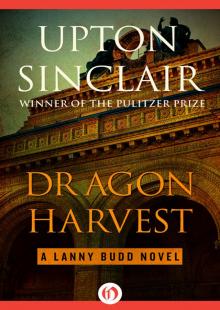 Dragon Harvest
Dragon Harvest The Jungle
The Jungle Sylvia's Marriage
Sylvia's Marriage Oil! A Novel by Upton Sinclair
Oil! A Novel by Upton Sinclair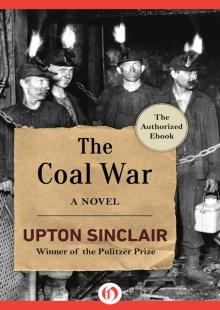 The Coal War: A Novel
The Coal War: A Novel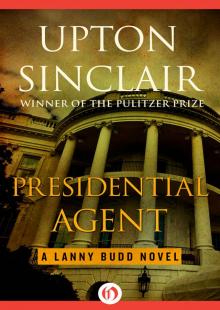 Presidential Agent
Presidential Agent World's End
World's End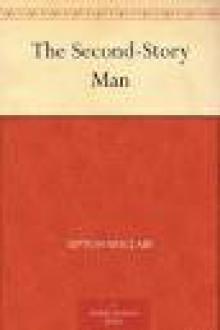 The Second-Story Man
The Second-Story Man O Shepherd, Speak!
O Shepherd, Speak!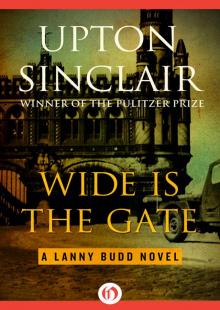 Wide Is the Gate
Wide Is the Gate The Return of Lanny Budd
The Return of Lanny Budd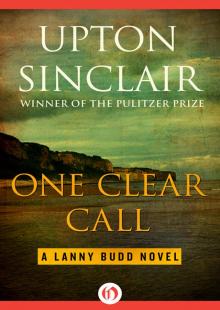 One Clear Call I
One Clear Call I 100%: the Story of a Patriot
100%: the Story of a Patriot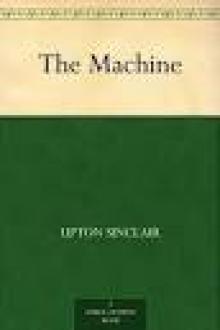 The Machine
The Machine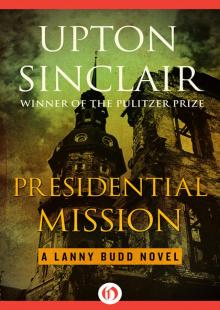 Presidential Mission
Presidential Mission A Cadet's Honor: Mark Mallory's Heroism
A Cadet's Honor: Mark Mallory's Heroism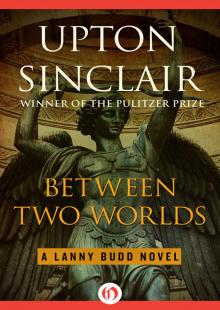 Between Two Worlds
Between Two Worlds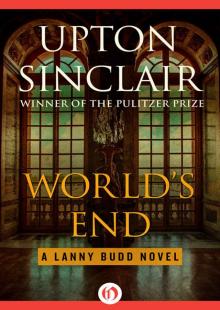 World's End (The Lanny Budd Novels)
World's End (The Lanny Budd Novels)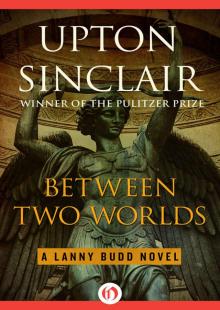 Between Two Worlds (The Lanny Budd Novels)
Between Two Worlds (The Lanny Budd Novels)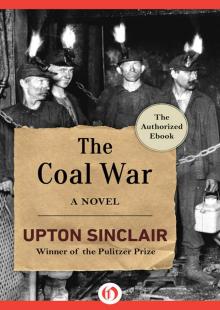 The Coal War
The Coal War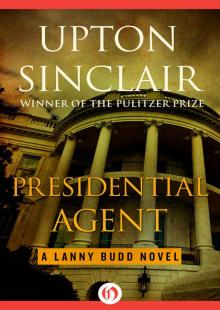 Presidential Agent (The Lanny Budd Novels)
Presidential Agent (The Lanny Budd Novels) Oil (filmed as There Will Be Blood)
Oil (filmed as There Will Be Blood)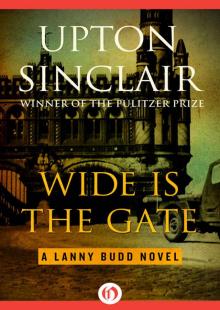 Wide Is the Gate (The Lanny Budd Novels)
Wide Is the Gate (The Lanny Budd Novels)